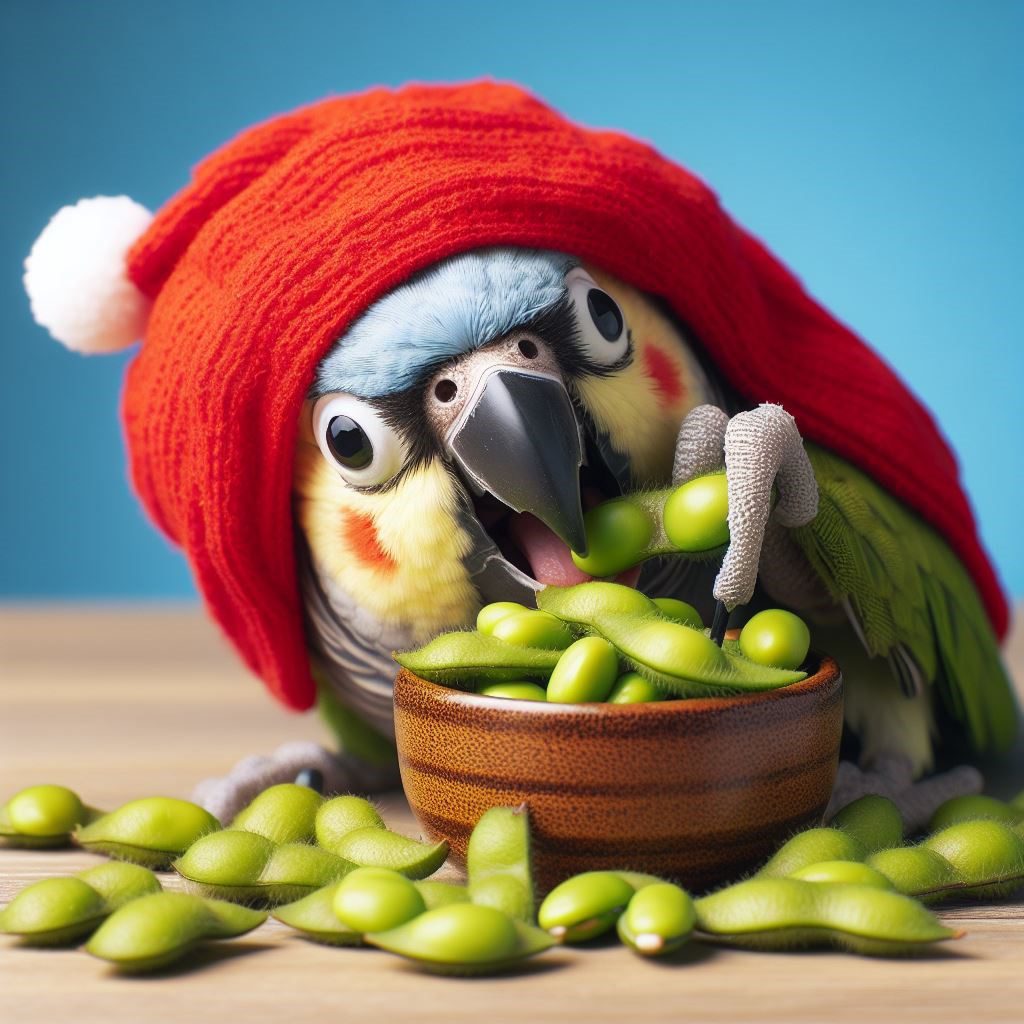I take great pride in my parrot’s diet, even more so than my own. As a parrot parent, I know that there are so many requirements they have and I try to meet them by giving him foods filled with nutrients that can make his little life better. One of the foods he loves is edamame, a premature soybean that people harvest before they have ripened. Edamame beans are typically gluten-free and super low in calories making them so appealing, but what about our parrots are they safe for them?

Can parrots eat edamame? Yes, parrots can eat edamame they are completely safe for them to have and offer many nutritional benefits that our parrots could benefit from. Edamame is an excellent source of protein, calcium, and iron along with providing vital antioxidants like vitamin C and vitamin A. They are also great for helping your parrot control their weight along with cardiovascular benefits. It’s not all perfect however, before buying you should make sure that you buy non-genetically modified edamame as organic edamame won’t contain any harmful additives.
In this article I’m going to outline the health benefits in detail, does it needs cooked and other some other things I think you should be aware of so don’t stop reading now or you’ll miss out!
Edamame Benefits For Parrots
We know edamame is good for our Parrots, but just how good is it? Let’s take a closer look at the nutritional content.
A half cup of shelled edamame contains :
| Calories | 120 |
| Protein | 11g |
| Carbs | 13g |
| Fat | 2.5g |
| Fiber | 9g |
Fiber
Fiber is plentiful in edamame and it helps your parrot with :
- Better gut health
- Improved bowel movements
- Helps your parrot be full for longer leading to weight maintenance
- Regulates the body’s use of sugars
Other foods that are high in fiber and completely safe for your parrot to eat are strawberries, bananas, berries, carrots, broccoli, and artichoke.
Protein
Protein is an essential nutrient for parrots, it helps them with cardiovascular health, leads to a better mood, produces healthy red blood cells, and keeps parrots satiated longer meaning less chance they overeat.
They also need it because protein is the main building block for their muscles and makes them to be able to fly, perch, and other basic movements that parrots do that’s why they must get enough of it.
Vitamin C
Edamame also contains vitamin C, a powerful antioxidant that can help your bird fight off cancers. It does this by neutralizing things called free radicals within the body. These free radicals try to break down and harm your parrot cells leading to things like heart disease and cancer, however, vitamin C counters them and stops this from happening.
Vitamin C will also boost your parrot’s immune system, lower cholesterol, and help maintain a healthy blood sugar.
Vitamin A
Vitamin A deficiency in birds is quite common but also preventable. A deficiency in vitamin A is called hypovitaminosis A it can present itself in the following symptoms :
- Sneezing
- Nasal discharge
- Swollen eyes
- Tiredness
- White plaques in the mouth
- Bad breath
- Increased thirst and urination
It benefits your parrot by keeping its immune system healthy, eyesight, and eye health, maintains mucus membranes, fights off respiratory diseases, and helps maintain healthy skin and feathers.
To prevent a deficiency in vitamin A you can feed your parrot foods like broccoli, red peppers, mango, and papaya to name a few.
Iron
Iron helps in the body by preserving important functions like general focus and energy, regulating blood temperature, keeps the immune system functioning and gastrointestinal processes.
It also helps with the function of hemoglobin, a protein that brings oxygen into the blood.
How You Should Feed Edamame To Your Parrot
When buying edamame I recommend sticking to fresh organic stuff as you know exactly what’s in it and there won’t be any additives or other processed items that might be bad for your parrot.
Edamame must be cooked before serving to your feathered friend it can’t be eaten raw as it’s a soy product that is poisonous unless cooked properly.
A quick and easy way to make edamame is to boil them. Boiling edamame is a popular cooking method that only requires a pot and a little water. Bring a pot of water to boil then add in your edamame. Cook the in-shell edamame for 5 minutes, or until the beans inside the pods are tender. Before serving, drain, rinse with cold water to cool, and season to taste.
Are There Any Risks To Feeding Your Parrot Edamame?
When cooked, with fresh organically chosen edamame, then it’s perfectly safe for your parrot to eat. However, there are some conflicting opinions about feeding your bird soy in their diet. I know some owners who outright won’t feed it to their parrots and others who do so without complaint.
Soy is one thing that’s being genetically modified now, which is why you need to buy fresh, organic edamame.
What Other Foods Can Your Parrot Eat?
You know edamame is safe for your Parrot to eat but if you’re like me then you’re always looking for new foods to improve your Parrot diet to create some variety and include vital things that aren’t already in your bird’s diet.
So what other foods can your Parrot eat?
- Fruit & Vegetables
Foods like asparagus, broccoli, carrots, peppers, bananas, blueberries, and pineapples are all fine and encouraged for your Parrot to eat.
- Nuts
Things like almonds, Brazil nuts, cashews, hazelnuts, pistachios, and walnuts can be fed to your parrot. Just be wary of the fat content in some of them so they may need to be treated as a snack for your Parrot. We don’t want them getting fat!
Edamame For Parrots – Final Thoughts
Given that you buy organic edamame, or one that hasn’t been genetically modified that might contain other harmful additives, then there’s no reason why edamame can’t be a nutritious snack your parrot can enjoy. After buying organic edamame the next important thing to make sure of is that you cook it properly as uncooked it can cause short-term digestive problems and possible long-term health issues.
If you follow the steps above there’s no reason why edamame can’t be a beneficial addition to your bird’s diet, however, it shouldn’t be a staple, which their diets mainly being made up of pellets, seeds, fruits, and vegetables.






